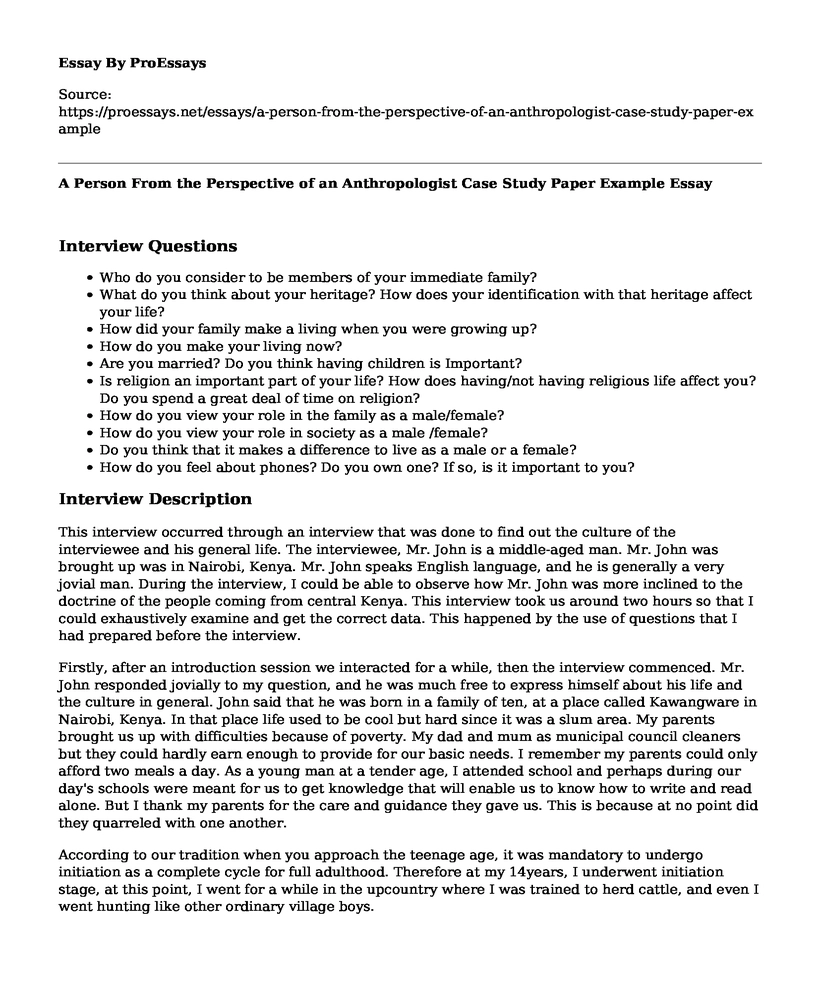Interview Questions
- Who do you consider to be members of your immediate family?
- What do you think about your heritage? How does your identification with that heritage affect your life?
- How did your family make a living when you were growing up?
- How do you make your living now?
- Are you married? Do you think having children is Important?
- Is religion an important part of your life? How does having/not having religious life affect you? Do you spend a great deal of time on religion?
- How do you view your role in the family as a male/female?
- How do you view your role in society as a male /female?
- Do you think that it makes a difference to live as a male or a female?
- How do you feel about phones? Do you own one? If so, is it important to you?
Interview Description
This interview occurred through an interview that was done to find out the culture of the interviewee and his general life. The interviewee, Mr. John is a middle-aged man. Mr. John was brought up was in Nairobi, Kenya. Mr. John speaks English language, and he is generally a very jovial man. During the interview, I could be able to observe how Mr. John was more inclined to the doctrine of the people coming from central Kenya. This interview took us around two hours so that I could exhaustively examine and get the correct data. This happened by the use of questions that I had prepared before the interview.
Firstly, after an introduction session we interacted for a while, then the interview commenced. Mr. John responded jovially to my question, and he was much free to express himself about his life and the culture in general. John said that he was born in a family of ten, at a place called Kawangware in Nairobi, Kenya. In that place life used to be cool but hard since it was a slum area. My parents brought us up with difficulties because of poverty. My dad and mum as municipal council cleaners but they could hardly earn enough to provide for our basic needs. I remember my parents could only afford two meals a day. As a young man at a tender age, I attended school and perhaps during our day's schools were meant for us to get knowledge that will enable us to know how to write and read alone. But I thank my parents for the care and guidance they gave us. This is because at no point did they quarreled with one another.
According to our tradition when you approach the teenage age, it was mandatory to undergo initiation as a complete cycle for full adulthood. Therefore at my 14years, I underwent initiation stage, at this point, I went for a while in the upcountry where I was trained to herd cattle, and even I went hunting like other ordinary village boys.
At this age I am married, most probably my immediate family members are my wife and our two kids. My wife's name is Jane, and my two kids are Jayden and Victoria. I love my family so much, and I appreciate being the head of the family. As a father and husband, I know my duty of taking care of my family. I value my roles as a man so much because, in our culture, men are respected, and I don't regret being a man.
As per our tradition, children should grow up while knowing the existence of God. We have been natured in our family to know God. I was introduced to African Inland Church (AIC) by my parents at the age of eight where I was baptized and given the name John. I do not regret having faith to believe in God.
On many occasions, I do appreciate the introduction of a mobile phone. Currently, the world has been made a global village, unlike in the past when sharing of information was not easy. I own a phone, in fact, a smartphone. This phone has enabled me to perform various tasks above all it has enhanced my communication to some of my friends and family members. Though to some extent these devices have some disadvantages like addiction to social platforms like facebook, twitter, and WhatsApp. This has been the primary challenge have been facing with the device.
Personal Insights
The interview with Mr. John was successful, and I learned a lot about his culture, kinship, gender dynamics, and tradition. It was not easy for me to view a person from the perspective of an anthropologist (Spradley, 2016). The interview was of importance to me as it enabled me to understand people from the anthropologists' view.
References
Spradley, J. P. (2016). The ethnographic interview. Waveland Press.
Cite this page
A Person From the Perspective of an Anthropologist Case Study Paper Example. (2022, Sep 07). Retrieved from https://proessays.net/essays/a-person-from-the-perspective-of-an-anthropologist-case-study-paper-example
If you are the original author of this essay and no longer wish to have it published on the ProEssays website, please click below to request its removal:
- The Pop Culture and Futurama Essay
- Janet's Development Stage: Case Study
- Marketing With Social Media: The Strong Student Event Paper Example
- Diversity and Health Assessments Essay Example
- Cherokees: A Southeastern Tribe Who Met White Invaders - Essay Sample
- The Patriarchal Tradition: Late Marriage in the 1500s-1800s - Essay Sample
- Paper Example on Colonel Bradford's Family Safety Priority During Plague







